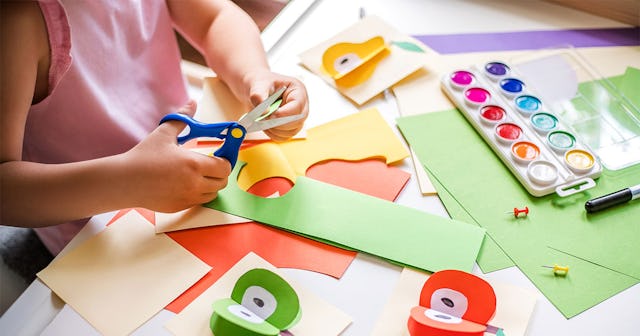Parents, Get Your Kid Ready For Kindergarten With Life Skills, Not Academics

My daughter is entering kindergarten in the fall. She is currently in pre-k and has learned all kinds of wonderful things. Yes, she knows her letters and her numbers, but she can’t read. And I don’t think that is a big deal at all. And, contrary to popular belief, neither do many kindergarten teachers.
Teachers want a child who can somewhat patiently wait their turn. They need children who know proper hand washing techniques, especially in the crazy times we are living in. It is important that a child. who has the ability, can dress themselves — zippers, snaps and buttons. Teachers don’t have time to work on 20 jackets or tie 20 pairs of shoes before recess. They will do it, of course, and know that some level of support is required, but the more we work on these skills before sending them to school, the better for everyone.
Somewhere along the line, prepping for kindergarten became an academic challenge. Parents feel that in order to be ready for kindergarten, their child needs to be able to read and write. Instead of pushing a child to read a book, it is better to make sure that they know how to use it. Seriously. Do they know how to properly hold a book? Do they realize when the words are upside down? Can they turn the pages on their own? Can they talk about the pictures? That is the important stuff, not to be a budding chapter book enthusiast at five.
Walking into kindergarten shouldn’t be a competition of who knows the most, ultimately making some kids feel inferior. Kindergartners should love going to school, not be intimidated. The youngest children learn through play, not highly academic situations, and this is backed by ample amounts of peer-reviewed science.
ChiccoDodiFC/Getty
We Are Teachers outlined the expectations for kindergarten children in 1970 vs. 2020. The differences are staggering. We’ve gone from being able to identify and copy letters and numbers, to writing a narrative with the order of how things happened and the child’s opinion. This is really tough stuff for such young kids!
Long gone are the days of playing a bit, having a snack and maybe taking a nap. Children in kindergarten are being academically prepared for first grade. But they are doing things that would have once been done by a first grader. Is it too much too soon?
Early education expert Dorothy Strickland, a Rutgers University professor and researcher, told the Washington Post “‘A child’s first learning experience determines a child’s attitude toward school for years to come.’ She maintains that the primary focus of kindergarten should be executive functions such as problem-solving, organizing, sequencing, conflict resolution, decision-making, and reasoning.”
Many teachers are in agreement. In a resignation letter published in the Washington Post, teacher Susan Sluyter said in part, “I began to feel a deep sense of loss of integrity. I felt my spirit, my passion as a teacher, slip away. I felt anger rise inside me. I felt I needed to survive by looking elsewhere and leaving the community I love so dearly. I did not feel I was leaving my job. I felt then and feel now that my job left me.”
If there is to be a paradigm shift, one that many kindergarten teachers feel is necessary, We Are Teachers suggests these life skills that a child should be learning at kindergarten age. Understandably, there’s a wide-rang of abilities and some kids will not be able to perform these functions, and that’s okay too.
Using the Bathroom
When using the bathroom, children should be able to properly sit on the seat and wipe themself. They should also be able to pull their clothing off and on without any help. And of course, be able to wash their hands.
Going to Lunch
evgenyatamanenko/Getty
Lunch can be a tough transition for kids. A child should know what their lunchbox looks like and how to use everything inside. For example, can they open a string cheese package or milk container on their own? Do they know to bring their thermos home but to throw their baggies away? They need to be able to clean up after themselves, too.
Simple Social Skills
A kindergartner should be working toward being able to tell someone their name, phone number and where they live, in case of an emergency. Knowing when to get an adult for help is very useful. Being able to wait their turn, share, line up properly, and lose gracefully are also great skills to work on, thought (obviously) mastery of these skills is not expected.
How to Behave in the Classroom
Parents should stress the importance of sitting in their chair and raising their hand. Kids are expected to be able to pack up their backpack on their own and getting their coat on without help. They should also understand the importance of keeping their hands to themselves.
Fine Motor Skills
This is a great way to start getting prepared for kindergarten. Practice cutting with scissors, holding and using a pencil, and making art are all invaluable skills for a child starting kindergarten. Playing with Play-Doh can also help a child’s dexterity.
What is a parent to do? Many teachers would tell you just to relax. Work on the big stuff and don’t sweat the small stuff. The sight words will be there when you need them and your child will learn at their own pace. Don’t get yourself caught up with what everyone else is doing, or how “academically advanced” someone else’s kid is compared to yours; just enjoy the magic of kindergarten and bask in your child’s new experiences.
This article was originally published on